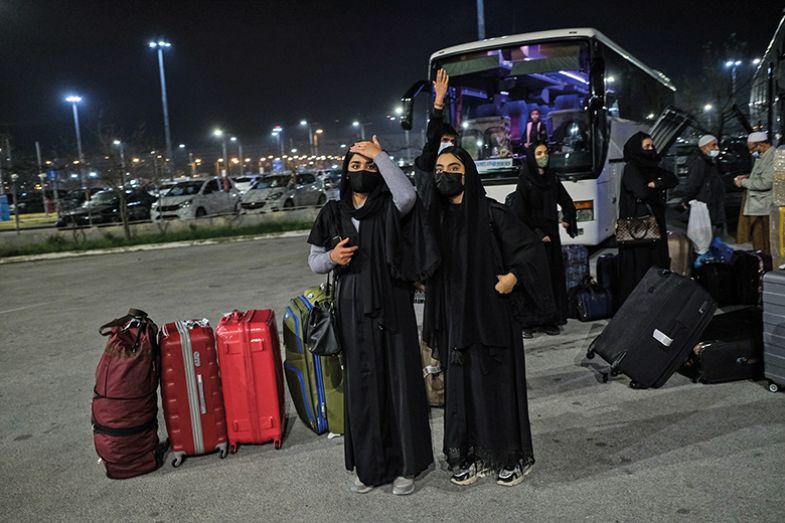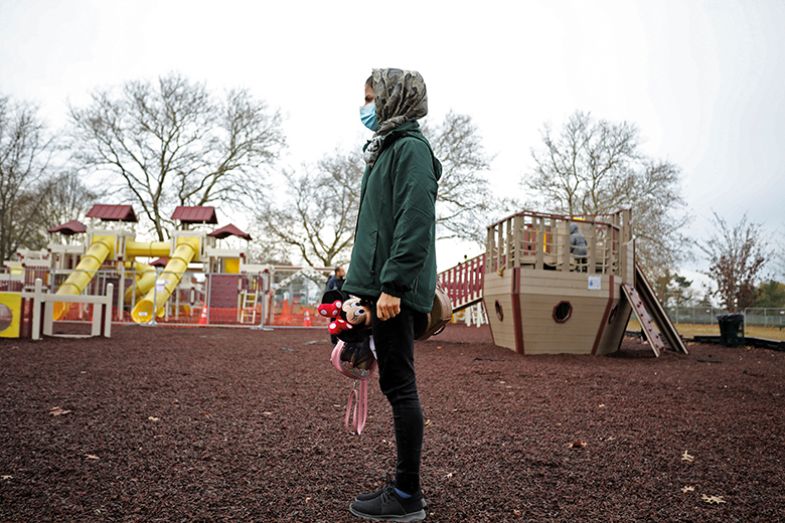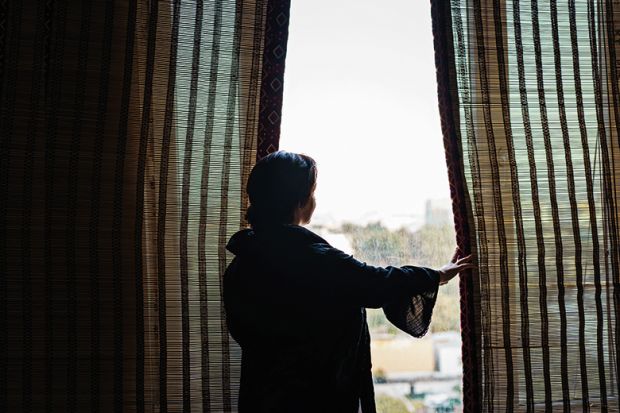On 14 August, Zeinab Rezaie was preparing for the greatest step of her education so far: leaving Afghanistan to take up a prestigious Fulbright fellowship in Colorado to study social entrepreneurship. But as she stood at a clinic waiting for a Covid test, Kabul broke into chaos as the Taliban entered its outskirts. People rushed in all directions. Shops’ shutters came down.
That night, Rezaie hardly slept, talking with her fiancé and sister, the three of them in disbelief that their hopes for the future had been dashed. She had always envisioned going abroad to study before coming back home to work with women in the country. Now that dream seemed impossible.
By the following day, the insurgents had seized power. Rezaie was among the few who made it through the crowds and into the airport. As her plane circled the tarmac, American soldiers shot into the air to disperse an increasingly desperate crowd packing the gates of the airport and clustered on the runways. She tried not to look from her window after she saw people clinging to the wheels of a jet that had just taken off.
THE Campus views: Three big mental health questions that academia must talk about
By the end of August, when its troops pulled out of Afghanistan, the US had evacuated more than 117,000 people from the country, according to the Department of Defense. Between April and September 2021, the UK evacuated 17,000 people. The official figures do not show how many of these Afghans were students, but experts say it is plausible that hundreds have left. (During the 2020-21 academic year, some 354 Afghan students were studying at US higher education institutions, according to the education search platform Erudera.) They represent an elite minority in a country where, even 20 years after the previous Taliban regime was toppled in the wake of 9/11, the proportion of adults with a tertiary education had only risen to 10.6 per cent.
For those Afghan students and researchers who have managed to leave the country, universities have played a critical role in their relocation, says Sarah Willcox, deputy director of Scholars at Risk, the New York-based international network devoted to providing help to those under threat. She describes the international response as “unprecedented in its scope and diversity”.
“Governments, NGOs, the higher education, human rights and humanitarian sectors have responded and organised in ways I’ve not seen in the 20+ years I’ve been in this field,” she explains, adding that more than 200 universities in the group’s network have invited scholars to their campuses. Some academics have been offered visiting appointments, with many universities arranging flights and settling-in allowances, housing, schooling for children and passes for local transportation.
But what about the students such as Rezaie, from whom the world has heard little since the evacuation flights took off at the end of August? How are they faring? Do they have what they need? And are they able to concentrate on their studies in the wake of such traumatic events?
At Colorado State University, Rezaie is, as far as she knows, the only recent arrival from Afghanistan. She says that staff and classmates have gone out of their way to give her household items. They’ve also encouraged her to take advantage of counselling services. But adjusting to Fort Collins has not been easy: “Everyone is nice and friendly, but it’s painful for me because they’re living their own lives [and] don’t know how people in the other parts of the world are living. I don’t want to make them sad with my stories – because they are always sad...”
“Everyone [here] is into sustainable fashion, how to manage food waste. I care about those things too, but there are a lot of social problems in our country, like now girls cannot go to school…In Afghanistan now people cannot manage to feed themselves.”
“Dina” (not her real name) is a student on the UK’s Chevening programme. She is among a dozen or so Afghan students on the programme who arrived in the UK without family. She and the other Chevening scholars came in a group after UK prime minister Boris Johnson intervened to get them out of Afghanistan. But in the chaos of evacuation, only some were able to take family with them. Dina’s mother relies on her for support, but the UK authorities have told Cheveners that they are not allowed to bring anyone beyond “direct dependants”, classified as partners or children.
The decision has crushed Dina even as she has become her family’s only lifeline. In the autumn, her Afghan bank account was frozen. Like other such students, she now relies on her Chevening stipend to send money back home. But she gets just over £1,100 a month – only enough to support her alone.
“The first month I wasn’t able to even send a coin,” she explains. “My laptop was broken during the evacuation, so I bought a refurbished one.”
Like others who left, Dina arrived with little more than a backpack. She also needs to pay for medication, not covered by the National Health Service, and other necessities. Her university temporarily waived accommodation fees while she got back on her feet, but the new year means that she will need to pay upwards of £800 a month for housing.
All the Chevening students who spoke with Times Higher Education stress that they appreciate the help provided by their universities, which have tried to pitch in as much as possible. In some cases, institutions have given students money for laptops or small amounts for vouchers to buy food and items such as kitchen utensils. Despite this, some have had to apply for hardship funding.
But their concerns over money pale in comparison to worries about their future.

“Amir”, another scholar on the programme who asked THE not to use his real name, says his status in the UK is uncertain. Both he and Dina received a stamp in their passport allowing them to stay for six months, but neither has heard back from the relevant authorities about their long-term visa status. As a result, Amir feels unable to “think what will happen after my graduation”.
Both say that they are waiting to find out whether they will qualify for the Afghan Relocations and Assistance Policy, but they have no assurance of their status – and universities know little more than the students. Dina’s frustration at her inability to get through to the UK government is palpable.
“I feel I am homeless – it’s still not clear whether the UK can be my home or not. It feels like the Home Office is in the sky,” she says, gesturing upward. “I just cannot reach them.”
For both these scholars, the situation has taken a toll on their mental health – another area where universities are trying to help. While the counselling has been a bit hit and miss, some of the advice has helped, Dina says, and she is trying to focus on what her counsellors have told her: “You have to concentrate on studies because your status might be resolved very soon, but if you miss your lectures, that will damage you in the future.”
The determination to push forward with her education also keeps her going. “The scholarship has opened other doors” for Dina, who wants to pursue a PhD in the UK if her legal status is clarified and her university is able to support her. She dreams of returning to Afghanistan one day to shape policies for women’s development and gender equality.
Amir also credits his programme for pushing him. Despite difficulty focusing in lectures, he describes the work as challenging, in a good way.
“Everything is turned over to the student. The student has to read a list of course material, come with questions to class,” he says of his experience in the UK. Instead of sit-down exams, Amir is evaluated on group work and essays.
“The material they’re providing is huge and very [up to date] – we’re studying journals published just a couple of years ago – and they’re providing us [with] theory that has had great results in countries around the world.”
Faculty are also more approachable than he is used to: “I can drop a simple message to my adviser that I have a problem and want to meet them.”
Dina agrees. “One of the professors is helping me a lot when I write a piece of work, commenting on it, encouraging me to focus more, read more. Compared to [a few] months ago, I’m getting better…I tell myself, when you can’t change anything in my country or here, why are you so stressed? I don’t want to lose my studies, to lose my mind.”
Amir also still struggles with thoughts about his family and his future. But he has given himself a mandate: “In the end I have to finish my studies. This is the only option. I’ve come to the conclusion that if there’s no way to rescue my family, then there is no way to manage the situation other than to stand on my own feet and survive by myself.”
Even for students with previous experience of education and life outside Afghanistan, the country’s shutdown has changed how the world sees them – and how they see themselves.
Mansoor Shams first came to Poland in 2017, under the EU’s Erasmus student mobility programme. Compared with what he had experienced in Afghanistan, he describes Polish universities as much more “student-centric”. He began his studies in business management in Łódź, but later moved to the Jagellonian University, Poland’s top institution. “In Afghanistan, they give you a chapter of a book for one semester…Here, I’m getting 180 to 200 pages,” he reports.
Shams’ family have left Afghanistan – a huge relief and a comfort to him. He lives with his siblings and nephews in a flat in central Kraków, where they stay free of charge thanks to a Polish woman who has helped them.
But even for Shams, there are clouds on the horizon. So far, he hasn’t asked his university for any aid or other assistance, but with money for another semester due soon and his earnings going to support his family, he will need a scholarship. His legal status concerns him even more.
He had always intended to study abroad and then take what he learned to improve the situation back in Afghanistan. But now, he reflects, “with my Afghan passport I’m in a desperate situation, because the world doesn’t recognise [me]. What will my future be if the world recognises the Taliban? Will I be able to go there? I don’t think so, because my way of living and thinking is different from the Taliban's.”
Afghan embassies around the world remain closed, and there is scant hope they will reopen any time soon. Currently, Shams’ visa allows him to work while he finishes his studies, but if he seeks asylum in Poland, he will have to give up his job.
“Applying for asylum sounds easy, but I’ve been to camps in Germany [holding centres used to house refugees] to visit some friends while I was a student and I don’t want that life,” he says. “But if I stay here, where will I be from?”

As the Afghan students progress in their studies and lives outside their homeland, they face a mass of obstacles. Like others, they have seminars to attend, research to do and papers to write. But they must also navigate complex and bewildering legal systems in a language that is not their native tongue.
So what can host universities do to help? At the most basic level, students say, they should be willing to listen to their problems. One student cites examples of how some of them “have been welcomed by the head of their programme – or even the head of the university”. Just being asked “What are your problems? How can we help you?” proved reassuring.
The students interviewed by THE are naturally grateful for any financial relief they have received and are generally reluctant to criticise their universities. They recognise that some of their problems fall outside what universities are equipped or can be expected to compensate for. But one student expresses disappointment about her experience of seeking advice from her university's international students’ office and legal services department. “We cannot do anything for you and your family because we have only done student cases and we haven’t [handled] anything similar” to her case, they told her.
More generally, the students commonly hope for more assistance in finding legal resources or organisations that might be able to help. They feel it would be very useful if universities were able to connect them with lawyers or staff who can advise them on their legal status and answer questions about how they can help their families emigrate. They also see universities as well positioned to serve as a bridge between them and the governments in the countries they’re studying in. Many currently advocate for themselves in their spare time – and would welcome any means of amplifying their voices.
Although universities are already doing a great deal, there are surely lessons here for how they might do even more for a cohort of students who have already suffered so much.
后记
Print headline: Afghan students: an uncertain future




